The Page Cavanaugh Trio – Famously Obscure or Obscurely Famous?
Sometimes these posts about classic jazz are a way to share longtime favorites of mine with some who have never heard them before. Other times, you get to come along with me on an odyssey where we all get to experience something for the first time more or less together. Today is the second kind. If you stick with me, I can all but guarantee that you have heard at least one of these players, though you probably never realized it.
I don’t know why it has taken me this long to look into the Page Cavanaugh Trio – you might think that when the leader of a vintage jazz group shares a last name with a guy who loves and occasionally writes about vintage jazz, a detailed examination of the group’s work would be a no-brainer. But here we are, with me just now taking a look at this fascinating trio that has both an extremely short and an extremely long history.
Walter Page Cavanaugh was originally from Kansas, the son of two ragtime piano players. Like so many of his age, he found himself in the Army in WWII. Cavanaugh was a talented piano player, who had spent time with a couple of “territory bands” that played venues in the central part of the US. In the Army his skills landed him in an entertainment unit, which led to him replacing another piano man in a group called The Three Sergeants. The group’s mission was to play at area Officers’ Clubs, and they were evidently quite popular.
The other members were Al Viola on guitar and Lloyd Pratt on bass, and following their muster out of the service in 1945 they kept doing what they had been doing, but now under the name of The Page Cavanaugh Trio.
The Trio was clearly influenced by the (Nat) King Cole Trio that had been making records since the 1930’s and who hit the big time in 1943 when they recorded Straighten Up And Fly Right. Every musician is influenced by those who came before, and it is immediately clear upon listening that Page Cavanaugh was influenced by Nat Cole in a big way.
But where the Cavanaugh Trio was purely its own thing was in their vocal style – Where Nat Cole (with his inimitable voice) sang and his bass and guitar players mostly kept their mouths shut, all three members of the Page Cavanaugh Trio sang – in a kind of whispered unison that did not sound like anyone else at all, certainly not in the immediate postwar years.
After cutting a few records for minor labels, they soon found themselves in the RCA Victor studios, with a few hits under their belts. The featured record today is one of them – a jived-up version of the familiar story of Goldilocks and the Three Bears. The song (complete with its clever lyrics) came from the fertile imagination of a young Bobby Troup, who is best known for a song he had sold to Nat King Cole about six months earlier – Route 66. Some will also remember Troup for his role as Dr. Joe Early in the 1970s television show “Emergency”, but his TV stardom came after a long and productive career in music.
When looking for musical selections, I don’t usually have to scramble like I did here. My usual go-to YouTube channels had nothing, and there was pretty much nothing in the way of quality re-issues either. The only re-issues I found were simply awful, with the audio so badly massaged and mangled that all of the charm was gone from them. Fortunately there is the Internet Archive where lots of old 78s have been uploaded, so the best examples I could find are on scratchy shellac 78s, the way they were originally listened to.
Cavanaugh has recounted Troup’s story about writing this song. It seems that one of his young daughters incessantly pestered their papa to tell the story of Goldilocks and The Three Bears. After the umpteenth telling, Troup wondered if maybe he could get a song out of it – and of course he could.
The Trio quickly caught the attention of some big fans, with Frank Sinatra among them. Shortly after hearing them for the first time, Sinatra proposed to fly them to New York to appear with him for some shows. In addition to accompanying Sinatra, they found themselves in demand as accompanists for other well-known performers like Doris Day and Mel Torme, getting label credit almost every time.
By 1947, the newcomers were voted number five of the top ten results for the Small Band category in Billboard Magazine’s first annual Disk Jockey Poll.
And how popular did a west coast jazz act have to be to get into a movie? These guys made it into several in the late 40’s. I found a couple of really great clips from 1948 and cannot decide which to use, so I have included them both below:
The first is a scene from “A Song Is Born”. That film was a Who’s Who of popular musical talent in service of a thin plot where some stodgy music professors take in a nightclub singer who is avoiding the police. Virginia Mayo lip syncs to the undeservedly obscure Jeri Sullivan on a tune called “Daddy-O” – another that could have been included in our earlier treatment of Girl Power in Classic Jazz.
The second is also from 1948, and was Doris Day’s very first movie – entitiled “Romance On The High Seas”. It is evident from watching these clips and listening to their accompaniment behind accomplished singers that Cavanaugh, Viola and Pratt were as good as anyone at providing a light but swinging rhythm that could bring the best out of any singer.
And lest you think that these guys were not capable of real playing without someone singing, this 1948 version of Body and Soul should dispel that notion. Although the familiar tune begins and ends with a typically relaxed tempo, these guys stand on the gas for most of the performance and display some audio fireworks that still come through from this old record. It is hard to avoid comparisons between Page Cavanaugh and Nat King Cole in their piano styles, but Cavanaugh acquitted himself quite well here in both his technical skills and his imagination for interesting musical phrasing.
More typical is this 1948 record, “No Moon At All”, which is one of their later efforts while still together. This one sounds quite modern for the time, and it was, having only been written the year before.
Both Al Viola and Lloyd Pratt moved on from the Trio by 1948-49. Pratt, the bassist, seems to have drifted into obscurity after playing behind some others like Bobby Troupe and Andre Previn in the early 1950’s. An item in Billboard Magazine’s May 20, 1972 issue indicates that he died on May 9th of that year of a heart attack at age 53. He had spent the previous ten years as general manager for Commercial Recorders, a San Francisco recording studio that specialized in radio commercials.
Al Viola, the guitarist, became the most successful of the three, and you have almost certainly heard his playing because he became Frank Sinatra’s go-to guitarist in the mid 1950s. Viola continued to back Ol’ Blue Eyes live and on record into the early 80’s. Also, did you ever wonder who played the mandolin in the 1973 film classic The Godfather? Funny you should ask, because I happen to know: It was that Italian guitarist Al Viola. Viola made a good living as a Los Angeles session musician and was part of literally hundreds of records and films over the years. He continued performing regularly until shortly before his 2007 death at age 87.
Page Cavanaugh seems to have had the longest career, if only by a little. He fronted small groups of various sizes with a variety of collaborators over the decades and became a fixture of SoCal’s many small nightclubs. He continued to perform and record until about a year before his death at 87 years old in 2008. In his last few years he even played several reunion performances with Al Viola in the small venues that had become his home.
So how did a group that hit it so big and could play such good music slip so far into obscurity? Part of it could be that they seemed to be more popular among musicians than among the general public. Or did the easy money of accompanying solo stars keep them from doing more on their own? Of course, even the great Nat Cole’s Trio was becoming less and less active after 1948-49 because of changing tastes – but at least he had a singing voice that vaulted him to amazing heights, something Page Cavanaugh lacked after his mates moved on. And could later jazz fans have seen them as little more than a white boys’ knock-off of the King Cole Trio? There is probably something to each of these theories, and likely more besides.
Whatever else it may have been, the Page Cavanaugh Trio was a group that, at its best, could keep up with Nat Cole’s group in every way (albeit with a different vocal style). Maybe the people in charge of the vaults at RCA will eventually make their way to a quality reissue of some of this group’s work. Because their music is still worth listening to.
Further Listening for those inclined:
One of the group’s early hits – All Of Me (1946)
An obscure (but fun) Bobby Troup tune that shows his way with lyrics – Triskaidekaphobia (1946)
Another great tune – You Say The Nicest Things Baby (1948)
A later effort – I would Do Anything For You (1948)
Backing Frank Sinatra – You Can Take My Word For It Baby (1946)
Backing Mel Torme – Isn’t It A Lovely Day (1947)
Music Credits: YouTube pages as identified, and from The Internet Archive
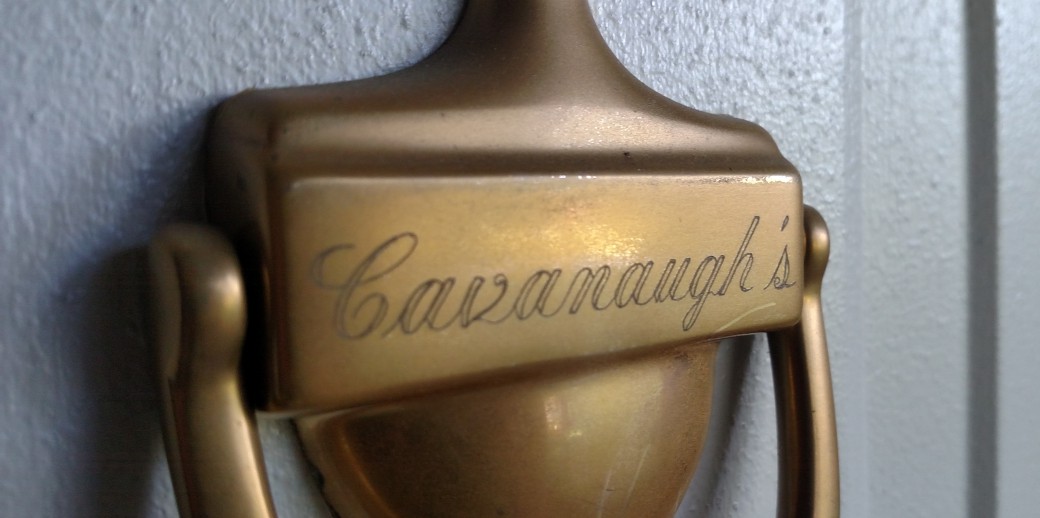



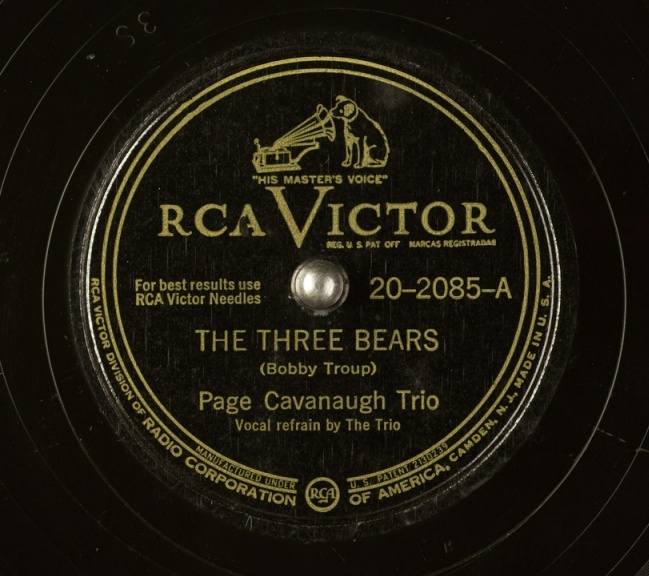

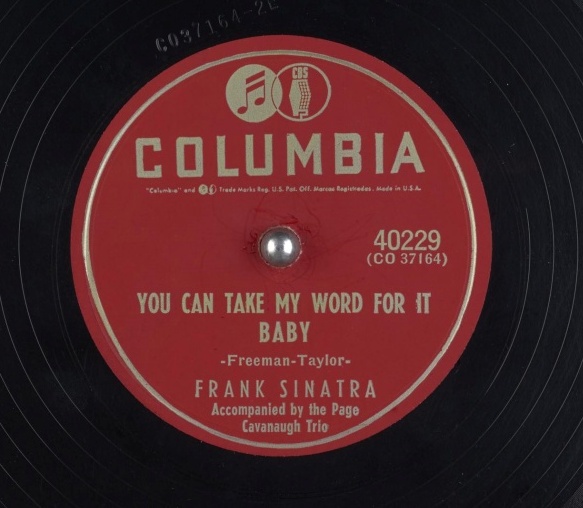


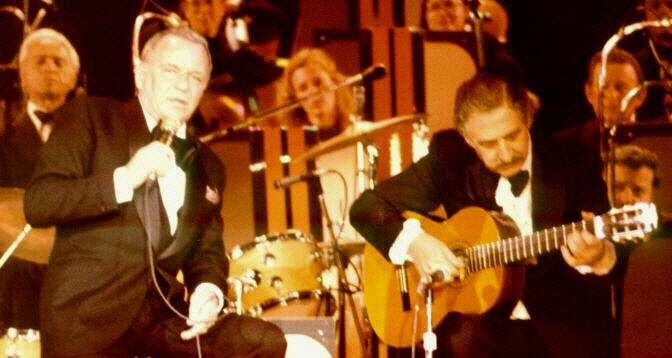
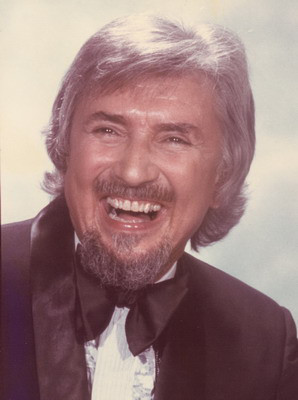


J.P. Another fascinating jazz entry to ponder for the weekend! I’d like to say the boys were way off my radar, but I have to admit to running into that Virginia Mayo cut a while back (Whoa, that dress!), but to my shame, not even thinking about the Trio in that, sort of thought they were another nameless Hollywood movie construct. Whoa was me for not being more interested. Thanks for this.
LikeLiked by 2 people
Thanks Andy. What you did with the Virginia Mayo clip is the same thing I did with the Doris Day clip when I came across it quite a few months ago – all I saw was Doris and some anonymous Hollywood guys in the roles of musicians. Now we both know better.
I am really amazed that there has not (at least so far as I can tell) been a decent reissue of any of this music. For as popular as those guys were for a short time, they have fallen deep into a memory hole.
The other thing this has taught me is that I am going to have to shine the spotlight onto Bobby Troup at some point. He was a really fascinating guy.
LikeLike
Lest we forget, let’s not sweep Bobby Troup’s appearance in Perry Mason, as the beatnik “Buzzie”, in the case of the Jaded Joker, under the carpet. 1959 no less! Only one of his three appearances on Perry!
LikeLiked by 1 person
Fascinating and enjoyable piece.
LikeLiked by 1 person
Thank you! Any time I can bring a little fascination and enjoyment into someone’s day, I count it as a win.
LikeLike
Your winning percentage should earn you the equivalent of a Cy Young Award.
LikeLiked by 1 person
I blush!
LikeLike
That was fun, JP – thanks! I’d never heard of the Trio before (and “Viola” is an awesome name for a musician) but I certainly enjoyed the audio/video tour. I will also admit to getting thoroughly distracted by Virginia Mayo. Even with the lip-sync’ing, I couldn’t take my eyes off of her. The dress certainly helped 🙂
LikeLiked by 1 person
It is interesting how many piano styles there are for those at the top of the heap. The more I listened to Page Cavanaugh at the keyboard the more I liked him.
And yes, Viola was a great name, especially for a string player.
LikeLiked by 1 person
Thanks for this one. I too am a descendent of Dermot Mac Murrough not to mention a musician who spent 30 years playing mostly in the jazz idiom.
LikeLiked by 1 person
I’m glad you enjoyed this one! I certainly enjoyed learning about them. And kudos on a career as a musician! I wish I had been a better player. I managed to play a workmanlike trombone in high school, but was always a weak sight reader and never developed any real skill. The great jazz in my head never translated to anything I could play. 🙂
LikeLike
I loved Page. I first met him after seeing as a special guest in a Michael Feinstein concert at the Greek Theatre. Michael said that Page performs at The Money Tree in Burbank. I couldn’t believe someone of that talent would be at a little piano bar, but he was, and for years I sat next to Page at the piano. Between songs he would tell me about the various songs and composers. Page did indeed play with everyone! Page and his trio even lent their voices to an animated Disney short called “The Truth About Mother Goose.”
Page was a super guy! He and I became close and when I got married he even came and sang a song in our wedding.
When I met Page in 1991, Al Viola was back with him playing every week at the Money Tree, and they were both still amazing! The trio released a couple of CDs with Phil Mallory as the bassist. Nice, crisp, digital high quality recordings with classic songs and even “The Three Bears.”
You had mentioned that Page was influenced by Nat King Cole, and while he liked Nat King Cole, he was a huge fan of Art Tatum.
When Page passed away I was honored to be asked to produce a memorial tribute to him.
You wrote a really nice piece about Page. I hope this offered a little more insight.
LikeLiked by 1 person
Wow, thank you so much for sharing these personal experiences! I continue to listen to the trio’s music and am still struck by his talent and artistry. How great it must have been to become friends.
LikeLike
Pingback: High-Maintenance Women In Jazz Lyrics – And The Men Who Kept Them | J. P.'s Blog